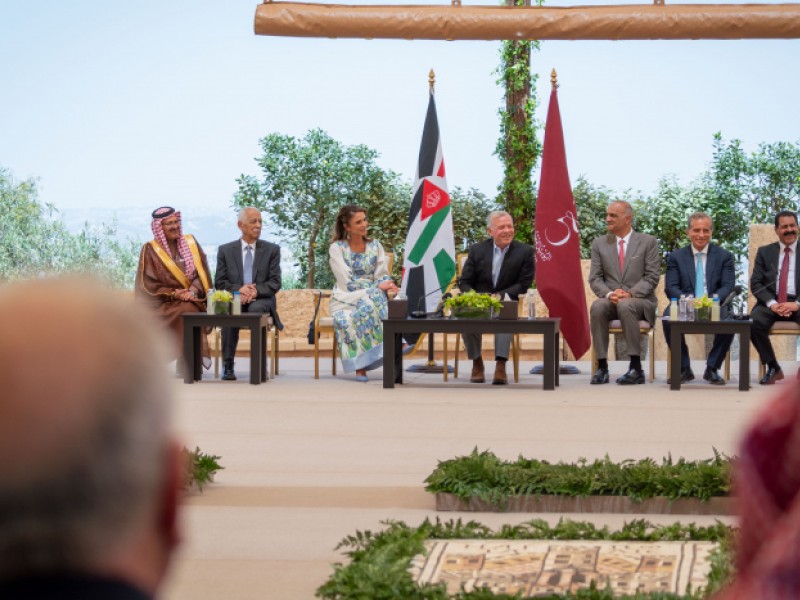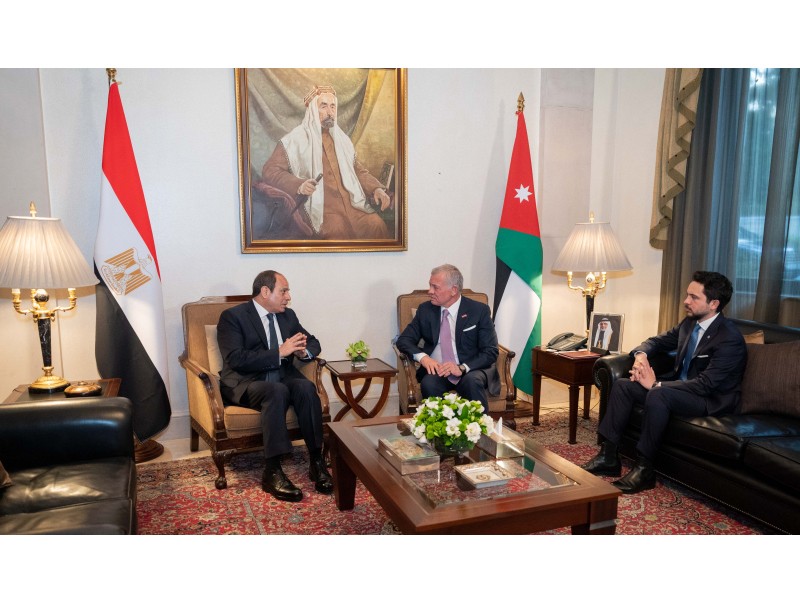Arab Regional Conference for Family Protection Opens
(Jordan Times, Rana Husseini - Amman) Around one-third of Jordanians reported they were aware that incidents of violence occur in their own families, according to a local survey on domestic violence released on Tuesday.
Wives and mothers were the most vulnerable family members, according to the survey entitled, “Domestic Violence in Jordan, Knowledge, Attitudes and Status, 2005.”
The survey findings were released on the first day of the Arab Regional Conference for Family Protection, held under the theme “Working Together for Family Protection.”
Her Majesty Queen Rania, chairperson of the National Council for Family Affairs (NCFA), acted as patron at the conference, which will conclude its working sessions on Thursday.
Queen Rania was recently granted the title of the World Health Organisation (WHO) Patron for Violence Prevention in the Eastern Mediterranean Region, based on her national and international efforts in the family protection field.
The survey, conducted by the NCFA and other local experts, was based on a sample of 1,500 families, including one interview with a family member of these families.
Focus group discussions were organised to gather quantitative data that provides insights into the various aspects of family violence.
It aimed at exploring the cultural aspects of family violence, as well as related practices in Jordanian society.
Around 90 per cent of those surveyed said the main source of information on family violence was television. Fifty per cent said they learned about the issue from friends, 42 from family, 39.1 from the newspapers, 27.3 from the mosque and 23.7 from the radio.
Very few people mentioned magazines and nongovernmental organisations, according to the survey.
Another finding revealed that males aged 12 and above were more vulnerable than girls of the same age.
This, the survey concluded, is related to the fact that boys are brought up to be aggressive and rebellious, while girls are brought up to be more submissive.
Some of the recommendations presented by the survey included providing rehabilitation services for victims, offenders and their families and setting up family counselling centres across the Kingdom.
Promoting services and programmes that address the needs of victims, perpetrators and their families, and ensuring that services are provided across the Kingdom, was another recommendation.
On the media level, the survey recommended developing a comprehensive national media plan that addresses the various dimensions of family violence and targets all ages and social groups.
During the opening ceremony, which was attended by HRH Princess Muna, Prime Minister Marouf Bakhit and other officials and ministers, a presentation was given on the National Framework for Family Protection (NFFP) featuring its objectives and operational procedures.
The NFFP, the first initiative of its kind in the Arab world, operates under six stages starting from early detection through to judicial procedures and family support mechanisms.
Speaking during the opening session, British Ambassador to Jordan Christopher Prentice told the gathering that family violence is by “no means particular to Jordan or this region.”
“Women and children are at risk from violence everywhere in the world, and in every walk of life... In Britain, one in four women have been victims of domestic violence,” the ambassador said.
He added the “persistence of domestic violence and of [so-called] honour killings calls for a need to strategise around addressing gender inequalities and child rights.
“We need to be clear about the actions which are still required,” Prentice said.
Director of the Public Security Department Lt.Gen. Mohammad Aitan and NCFA Secretary General Jamil Smadi also delivered addresses at the opening session.
They stressed the importance of sharing experiences and proposing practical solutions to address issues of family violence.
The conference seeks to advance best practices in protection, prevention and treatment of the physical, psychological, emotional, mental, social, and economic implications of family violence inflicted on children, women and men in all stages of life.
In addition, the conference aims at introducing the extent, forms, causes, and implications of family violence, explore its different facets, develop a multidisciplinary approach to address family protection, and encourage establishing partnerships with international specialists and NGOs.
The participants from17 countries include specialists and experts from governmental and nongovernmental organisations working in the field of family protection, both locally and regionally.
Countries taking part in the conference include Egypt, Syria, Libya, Algeria, Sudan, Qatar, Bahrain, Kuwait, Morocco, Yemen, Saudi Arabia, the United Arab Emirates, Palestine, Iraq, Lebanon, Pakistan, Iran and Jordan.
The experts are exploring emerging issues concerning domestic abuse over recent years as well as exchanging experiences and best practices in combating family violence.
Training sessions will be held for practitioners, such as interviewing child sexual abuse victims, case management skills for social workers and the medical evaluation of sexual abuse victims.
The conference is organised by the NCFA, the Family Protection Project and the Public Security Directorate's Family Protection Department.
The event is sponsored by the UK government's Department for International Development, the Swiss Agency for Cooperation, Save the Children, the Danish ministry of foreign affairs, UNICEF, WHO and Microsoft.
Domestic violence statistics
• In 2000, an estimated 520,000 people in the world died as a result of violent acts from family members or close relatives
• Over 57,000 children under the age of 15 died as a result of violence, including rape and neglect
• Research shows that 20 per cent of women suffer from sexual abuse worldwide
• Research shows that 4-7 per cent of elderly people suffer from abuse and violence either at the hands of family members or staff at care homes and institutions.
Source: WHO Violence and Health – Jordan Report 2005
Jordan Times, Wednesday, December 14, 2005
Featured
Queen Rania's official website
This website does not support old browsers. To view this website, Please upgrade your browser to IE 9 or greater
Your browser is out of date. It has known security flaws and may not display all features of this and other websites. Learn how to update your browser



